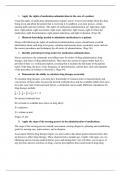1. Apply the rights of medication administration in the care of a patient. Using the rights of medication administration requires nurses to have knowledge about the drug being given and about the patient that is receiving it. In addition, you must possess certain nursing skills and interventions. Th e rights of medication administration are: right drug, right dose, right patient, right assessment, right route, right time, right reason, right to refuse the medication, right documentation, right patient education, and right evaluation. (Page 36) 2. Illustrate knowledge needed to administer medications to a patient. Along with following the rights of medication administration, nurses should learn essential information about each drug to be given, calculate and measure doses accurately, know and use the correct procedures and techniques for all routes of administration. (Page 36) 3. Identify and interpret drug orders for medication administration. Nurses must know the commonly used abbreviates for routes of drug administration, drug dosages, and times of drug administration. They must also ensure to repeat orders back to a provider if there is a verbal prescription, ensuring that it includes the full name of the patient, name of the drug, the dose, route, frequency of administration, and the date, time and signature of the prescriber (if written or electronic). (Page 44) 4. Demonstrate the ability to calculate drug dosages accurately. To calculate drug dosages, you must have knowledge of common units of measurements and conversions of those units, because the desired (ordered ) dose and the available (label) dose must be in the same unit of mea surement before a calculation can be made. Different calculations for drug dosages include: 𝐷
𝐻=𝑋
𝑉 ; 𝑉
𝐻=𝐷
𝑋; or 𝐷
𝐻×𝑉=𝑋 D= desired (ordered) dose H= on hand or available dose (dose on drug label) X= unknown V= volume or unit (Pages 47 -48) 5. Apply the steps of the nursing process in the administration of medications. The steps of the nursing process include assessment, nursing diagnosis, planning and establishing goals for nursing care, interventions, and evaluation. Assessment: Before drug therapy begins you must collect data about patient characteristics that are known to affect drug therapy. These characteristics include age, weight, vital signs, sex, etc. Obtaining and reviewing medical history prior and during their visit will allow you to know of any previous adverse reactions to drugs, current prescriptions that could result in drug -drug




